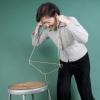Search Results
Showing results 61 to 80 of 142
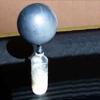
Yeast-Air Balloons
Source Institutions
In this activity, learners make a yeast-air balloon to get a better idea of what yeast can do. Learners discover that the purpose of leaveners like yeast is to produce the gas that makes bread rise.
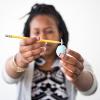
Thread the Needle: Using Two Eyes Gives You Depth Perception
Source Institutions
Closing one eye eliminates one of the clues that your brain uses to judge depth. Trying to perform a simple task with one eye closed demonstrates how much you rely on your depth perception.
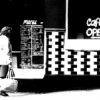
Cafe Wall Illusion
Source Institutions
In this fun and interactive online exhibit, the straight lines of a tile wall appear to curve. The learner moves the rows of tiles and changes the color of the grout to achieve the intriguing effect.
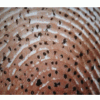
Sweat Spot
Source Institutions
In this activity, learners use a chemical reaction to visualize where moisture forms on the body.
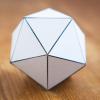
Viral Packaging
Source Institutions
In this activity, learners create virus models, including nucleic acid and proteins, using simple materials. This resource includes information about virus structure and gene therapy.
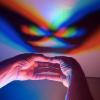
Colored Shadows
Source Institutions
In this optics activity, learners discover that not all shadows are black. Learners explore human color perception by using colored lights to make additive color mixtures.
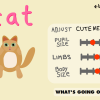
Cutify: What Makes for Cute?
Source Institutions
In this online activity exploring our perception of "cuteness," learners adjust various factors (like pupil size or length of limbs) on a face, a cat, and a hammer.
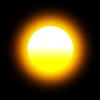
Oil Spot Photometer
Source Institutions
In this math activity related to light, learners assemble a photometer and use it to estimate the power output of the Sun.
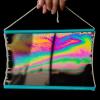
Cellular Soap Opera
Source Institutions
In this activity, learners create a large film of soap and experiment with what can and cannot pass through it.

Making Naked Eggs: Eggs Without Shells
Source Institutions
This is an activity about acid-base reactions using eggs and vinegar. Learners place eggs inside a container of vinegar and leave to soak overnight.
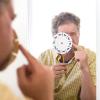
Whirling Watcher: Make a Stroboscope
Source Institutions
In this activity, learners make a stroboscope--a spinning disk with slits around the edge that you look through.
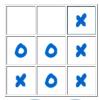
Tic-Tac-Toe
Source Institutions
In this online version of the classic paper and pencil game, learners practice looking ahead to anticipate an opponent's move.
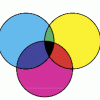
Three Circles of Pigments
Source Institutions
In this activity, learners overlap the three primary colors to see how all other colors are made.
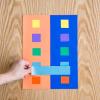
Color Contrast
Source Institutions
Do you have a hard time matching paint swatches with your furniture? When you consider human perception, color is context dependent.
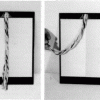
Gray Step
Source Institutions
In this activity, learners discover that it's difficult to distinguish between two different shades of gray when they aren't separated by a boundary.

Proprioception: Wiggle where you're at
Source Institutions
We're told from a young age that we have 5 senses, but we have many more. One of which is our awareness of our own body part's orientation and position.

Michelle O (formerly Vanna)
Source Institutions
We don't normally view people upside down and so our brains aren't accustomed to it.
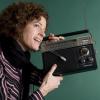
Radiohead
Source Institutions
When you teeth clatter, they make quite the racket disproportionately to how much they actually sound to someone else.
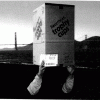
Personal Pinhole Theater
Source Institutions
Have you ever heard of a camera without a lens? In this activity, learners create a pinhole camera out of simple materials. They'll see the world in a whole new way: upside down and backwards!

